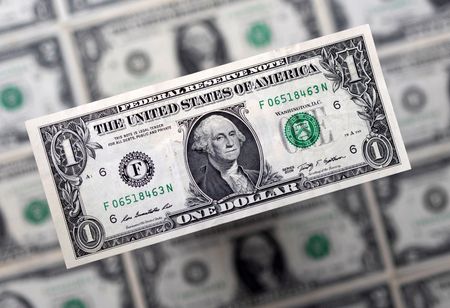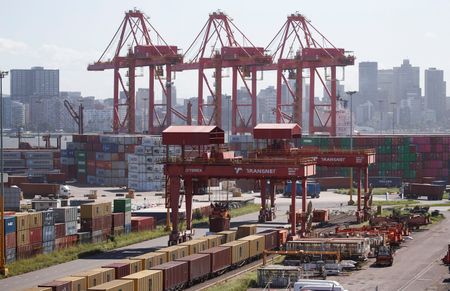By Chris Prentice and Marc Jones
NEW YORK/LONDON (Reuters) -Oil dropped over 2% on Thursday as a potential U.S.-Iran nuclear deal raised the prospect of increased global crude supply, and a recent stock market rally stalled.
The dive in crude nudged both the dollar and benchmark government bond yields, a proxy for national borrowing costs, lower.
U.S. Federal Reserve officials feel they need to reconsider the key elements around both jobs and inflation in their current approach to monetary policy, Chair Jerome Powell said during opening remarks at a two-day conference.
Brent futures dropped over 2.5% to $64.39 a barrel as U.S. President Donald Trump, in the midst of a Middle East tour, said he was getting close to securing a deal with Iran – and that Tehran had “sort of” agreed to the terms.
Ali Shamkhani, an adviser to Iran’s Supreme Leader Ayatollah Ali Khamenei, had said in an NBC interview that the country would commit to never making nuclear weapons and get rid of its stockpiles of highly-enriched uranium.
BNP Paribas economist Paul Hollingsworth said the drop in oil compounded the deflationary pressures already in play in places like Europe where U.S. tariff worries are lingering.
“Everyone is finding it difficult to navigate the volatility in the announcements,” Hollingsworth said.
MSCI’s gauge of stocks across the globe fell 0.4% to 871.03.
In Europe, the continent-wide STOXX 600 index recovered from earlier losses that were led by the energy sector. It was up 0.2%.
April retail sales barely rose and jobless figures were steady, in key U.S. data releases.
On Wall Street, the Dow Jones Industrial Average and the S&P 500 both fell 0.4%, and the Nasdaq Composite dropped 0.9%.
Retailer Walmart posted solid first-quarter sales numbers, but it became the latest to warn about the high costs of Trump’s trade tariffs and did not provide second-quarter profit guidance due to the uncertainty.
“We may be entering a period of more frequent, and potentially more persistent, supply shocks,” the Fed’s Powell said.
Britain’s economy grew by a quicker-than-expected 0.2% in March, data showed. Industrial production in the 20-nation euro zone also rose far more than predicted although overall first-quarter GDP growth disappointed.
The yield on the benchmark German 10-year Bunds fell 5.3 basis points to 2.639%. [GVD/EUR]
Yields on benchmark U.S. 10-year notes fell 3.1 basis points to 4.497%, amid worries that Trump’s budget package would add trillions of dollars to the U.S. debt. [US/]
DATA DELUGE
Investors were greeted with a plethora of good news earlier this week, from a U.S.-China trade-war truce to a raft of headline-grabbing investment deals from the Middle East during Trump’s Gulf tour.
But most of the optimism had died down by Thursday, leaving MSCI’s broadest index of Asia-Pacific shares outside Japan down 0.15%.
“We’ve had a huge party, everyone’s hung over, and now we’re just recuperating and waiting for the next big party,” said Tony Sycamore, a market analyst at IG.
In currencies, the dollar was struggling to extend its strong gains made at the start of the week, with the dollar index down 0.08% against a basket of major currencies.
The euro was up 0.08%.
Moves against the Korean won were particularly choppy for a second straight day, after news that South Korea’s deputy finance minister Choi Ji-young met with Robert Kaproth, assistant secretary for international finance at the U.S. Treasury, to discuss the dollar/won market on May 5.
In commodities, spot gold regained its footing, up 0.7% to $3,200.59 an ounce. [GOL/]
(Additional reporting by Rae Wee in Singapore, editing by Ed Osmond and Rod Nickel)








